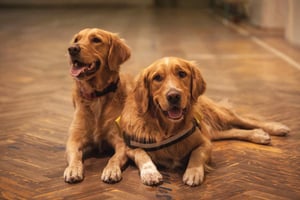Crate training your puppy can be a great way to help them feel secure and comfortable during the...
Training Your 6-Month Old Dog: Essential Tips and Tricks
Training a 6-month old dog can be a daunting task for any pet owner. However, having the right knowledge and understanding of the process can make it a much more enjoyable and straightforward experience. This article will provide you with essential tips and tricks to help you effectively train your 6-month old dog.
Understanding Your Dog's Developmental Stage
Before starting the training process, it is important to understand the developmental stage of your 6-month old dog. At this age, your pup is beginning to transition from puppy to adulthood, and will be showing signs of independence and curiosity. The best way to approach training at this age is to remain consistent, positive, and patient.
Positive Reinforcement is key when it comes to training your 6-month old dog. Positive reinforcement is a technique that rewards good behavior with praise and treats. This helps to build a positive association between the behavior and the reward, and encourages your pup to continue the behavior.
Establishing Boundaries and Routines
Establishing boundaries and routines is essential for any pet owner, but especially important when it comes to training a 6-month old dog. Establishing boundaries will help your pup understand what is expected of them and create a sense of security and consistency.
Routines are also important for training your 6-month old dog. Having a consistent schedule for feeding, potty-training, and playtime will help your pup understand what is expected of them and create a sense of security.
Potty Training
Potty training is one of the most important aspects of training your 6-month old dog. At this age, your pup should be able to hold their bladder for up to 8 hours, so it is important to create a potty-training schedule that works for both you and your pup.
The best way to potty train your pup is to use the Crate Training Method. This method involves using a crate to create a safe space for your pup while they are learning to potty train. The crate should be big enough for your pup to stand up and turn around, but small enough that they don't want to use it as a bathroom.
When it comes to potty-training, it is important to be consistent and patient. If you catch your pup in the act of having an accident, quickly take them outside to finish and give them a treat when they are done. Eventually, your pup will learn to hold it until they are taken outside.
Basic Commands
Teaching your pup basic commands is an important part of the training process. This will help you establish a strong bond with your pup and create a sense of trust. The most important commands to teach your pup are: 'sit', 'stay', 'come', 'down', and 'heel'.
When teaching your pup basic commands, it is important to use positive reinforcement and to keep the lessons short and fun. Start with simple commands, such as 'sit', and gradually move on to more complex commands, such as 'down'. Give your pup plenty of praise and treats when they get it right, and be patient if they make a mistake.
Socialization
Socializing your 6-month old dog is an important part of the training process. This will help your pup become comfortable around other people and animals, and learn how to interact with them in a positive way.
The best way to socialize your pup is to introduce them to new people and animals gradually. Start with short meetings in a controlled environment and gradually increase the length and intensity of the meetings. Make sure to give your pup plenty of treats and praise when they interact positively with others.
Exercise and Mental Stimulation
Exercise and mental stimulation are essential for any pet, but especially important for a 6-month old dog. Exercise helps to keep your pup healthy and fit, while mental stimulation helps to keep them engaged and entertained.
The best way to exercise and mentally stimulate your pup is to provide them with plenty of daily walks, as well as interactive toys and games. Daily walks will help to keep your pup physically fit, while interactive toys and games will help to keep them mentally engaged and entertained.
Conclusion
Training a 6-month old dog can be a daunting task for any pet owner. However, having the right knowledge and understanding of the process can make it a much more enjoyable and straightforward experience. This article has provided you with essential tips and tricks to help you effectively train your 6-month old dog. Remember to remain consistent, positive, and patient in your approach, and to use positive reinforcement to reward good behavior.



